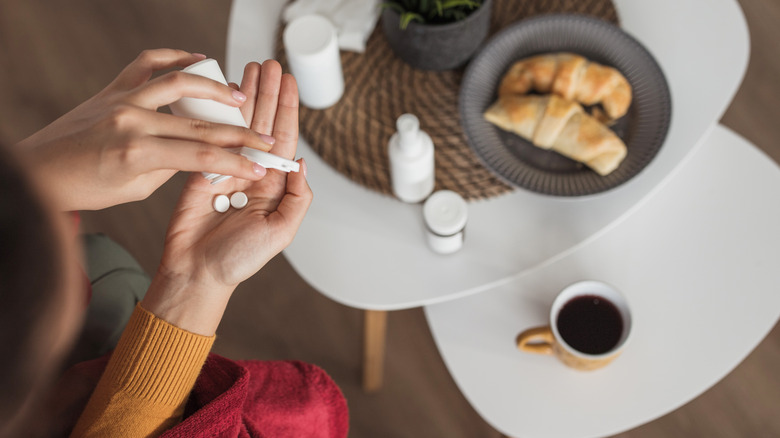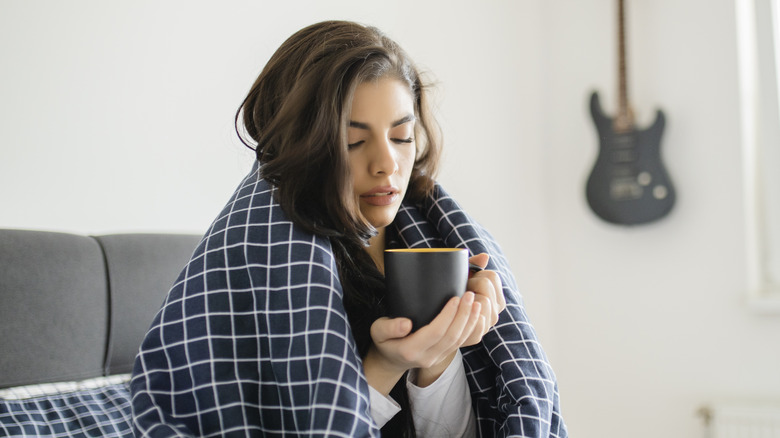The Common Medication You Should Avoid Taking With Coffee At All Costs
Coffee is such a staple in most of our lives that we don't often bat an eyelid when consuming two, three, or even four cups a day. After all, caffeine can be that comforting beverage you turn to come morning before the rush of the day sets in, and is also the hot drink you have during the day when you need that quick pick-me-up.
But healthcare professionals have long maintained that certain medications can have negative interactions with coffee — we're talking acid reflux pills, attention deficit hyperactivity disorder (ADHD) drugs, heart failure and hypertension medication, thyroid drugs, and more. According to 2020 research published in BioMed Research International, caffeine can interfere with the absorption, distribution, metabolism, and excretion of various medications.
If you're thinking you don't have heart disease or any other medical condition and you are in the clear when it comes to mixing coffee with drugs, think again. There's a very common drug you might be taking more often than others that reacts negatively with caffeine, too: cold or allergy medication. Here's why.
You'll be getting a double dose of stimulants when you combine the two
Some cold and allergy medications, like decongestants, contain stimulants to help keep you awake. Combining them with coffee can cause restlessness and make it hard for you to sleep.
For example, pseudoephedrine (brand names: Sudafed, Galpseud, Boots Decongestant, Care Decongestant) is a decongestant you might turn to in order to relieve a stuffy nose brought on by a number of medical conditions like colds, the flu, allergies, or sinusitis. Turns out, pseudoephedrine taken with coffee can exacerbate side effects like restlessness, shakiness, and an accelerated heartbeat.
Additionally, fexofenadine (brand name: Allegra), an antihistamine taken to relieve signs of an allergy, like itchy and watery eyes and nose, sneezing, and hives, also interacts negatively when consumed with caffeine. The drug's side effects of restlessness and sleeplessness could be further worsened in some people. In fact, even pain medications that contain caffeine as an ingredient ideally shouldn't be consumed together with common cold medications that have stimulants.
That being said, not all cold and allergy medications contain stimulants that could potentially be problematic when combined with coffee. To be sure, check with your healthcare provider about which cold and allergy medications are safe to consume with coffee and, if not, how far apart you should time the consumption of both. Apart from how coffee can affect your medication, is caffeine a concern in general when you're battling a disease?
Consuming coffee when you're sick: Things to consider
There are a few things to consider when you consume coffee while you're fighting a cold or allergy: dehydration, lack of sleep, and an upset stomach.
Drinking too much coffee can have a diuretic effect on your body, and dehydration is the opposite of what you want when you're trying to fight off an infection caused by disease. If your cold or flu is also causing some amount of gastrointestinal distress, you should definitely think twice about drinking coffee, especially if your gut is generally sensitive to caffeine. "[Hydration] is particularly a concern if the illness is severe, so if we're talking about a flu where there might be vomiting or diarrhea, then we really need to be careful because rehydrating and hydrating is very important," explained chair of the Department of Integrative Medicine and Nutritional Sciences at Jefferson Health in Philadelphia, Dr. Daniel Monti, per HuffPost.
Additionally if your coffee consumption keeps you awake when you should be resting, then that's a problem, too. Ultimately, getting over a disease is a lot about eating nutritious food, hydrating well, sleeping enough, and taking the right medications. If your caffeine consumption is going to interfere with any of these things working properly, you should stop drinking coffee.
Cold and allergy pills aside, there's something to be said about consuming coffee with another common medication — Tylenol. Click to read if you're interested.


